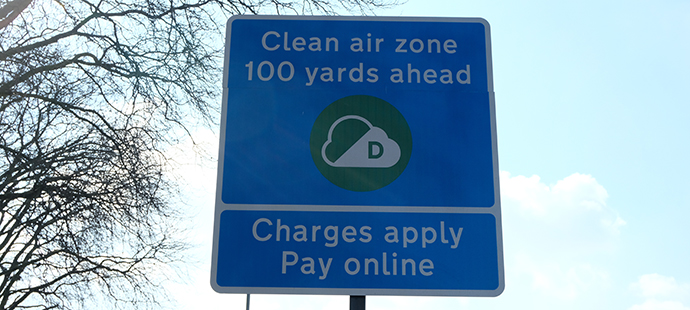Green light for Birmingham's clean air zone

Birmingham's Clean Air Zone (CAZ) launched officially on 14 June 2021 after a "soft landing" on 1 June, meaning drivers with the most high-polluting vehicles will be charged to drive within the Zone, unless they have an exemption.
Here, Carl Potter, principal and managing director for Birmingham at Avison Young, reflects on the CAZ and how the business, which employs more than 400 people from its Birmingham headquarters in Brindleyplace – within the Zone – is supporting the city's moves on sustainability, as well as driving its own commitments for a greener future.
A car-loving city
With approximately 100,000 vehicles in Birmingham anticipated to be impacted by the CAZ (Source AA) and car ownership being twice that in London (1 car per 1.7 people in Birmingham compared to 3.3 in London and 3.6 in Manchester), it would appear for all the strides the city is making when it comes to sustainable travel, such as extending the West Midlands Metro through the city and rail investment, we're still home to a large driving population.
People and planet – Avison Young's position
At Avison Young, we believe in the positive impact commercial real estate can make in people's lives and sustainability plays a major part in this. We have a business-wide target to become net zero carbon by 2030, and our commitment to achieving a more sustainable business that works for the planet, as much as people and profit, has never been more important.
This means the CAZ aligns with our business-wide goals, our 2030 net zero carbon target and overall approach to ESG that aims to reduce and encourage a reduction in carbon outputs wherever possible. The action taken by Birmingham's leaders to put the zone into effect, and deliver better air quality, both for urban areas of our city and the areas through which traffic would otherwise flow, such as Erdington, Ward End, Sparkbrook and Digbeth, is a strong prospect.
What does it mean in practice?
As a business powered by people, we do often rely on our workforce being "on the ground", able to visit clients and real estate in Birmingham and around the country. So, we needed to explore ways to do this, while minimising environmental impact, even before the pandemic or introduction of the CAZ.
In practice, this meant firstly looking at car usage. Previously, our Birmingham office provided free parking for employees and two "pool" cars for business critical travel. In 2020, both pool cars were terminated, with a view that if we require these again in the future, that they should be electric, not only bringing environmental benefits but being exempt of CAZ charges.
Alongside opening our office at the end of the first lockdown in July 2020, for employees that wanted to and felt comfortable to return, we also reduced our excess car parking provision from 110 spaces to 47. In line with our CSR policies a number of these spaces are to be fitted with electric recharging points. Open on a daily first come, first served bookings system, those that felt deterred from using public transport could still have the opportunity to travel to the office. One year on, while our office occupancy levels continue to slowly increase, the number of spaces provided remains adequate.
What about the CAZ?
Our Birmingham office is a 10-minute walk into the chargeable zone of the CAZ. This means we have had to consider options that meet not only our workforce and business needs, but our commitments to sustainability too.
We need to consider the mental and physical health of our employees, and as time goes on encourage more of them back into the office, ensuring that they are supported with travel options and not deterred by aversion to public transport and associated COVID-19 risk.
In support of the CAZ and its aims, we are not paying any CAZ charges incurred by employees. The purpose of the zone, as clearly set out by Birmingham City Council, is to discourage non-compliant vehicles and Avison Young fully supports that objective.
Yet, short term we are paying parking costs for employees parking outside of the CAZ and walking into the office. This continues our view that individuals should not be deterred from using the office but that they should respect the purpose of the CAZ. It is still early days for the CAZ, and we will be monitoring both our workforce requirements and the data from our UK Cities Recovery Index to see how the Zone is impacting the city and its recovery.

